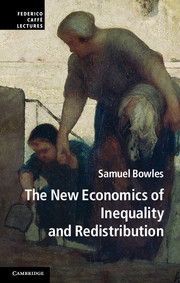Book contents
- Frontmatter
- Contents
- Illustrations
- Preface
- 1 The new economics of inequality and redistribution
- 2 The economic cost of wealth inequality
- 3 Feasible egalitarianism in a competitive world
- 4 Globalization, cultural standardization, and the politics of social insurance
- 5 Reciprocity, altruism, and the politics of redistribution
- 6 Conclusion
- Appendices
- Works cited
- Index
3 - Feasible egalitarianism in a competitive world
Published online by Cambridge University Press: 05 February 2013
- Frontmatter
- Contents
- Illustrations
- Preface
- 1 The new economics of inequality and redistribution
- 2 The economic cost of wealth inequality
- 3 Feasible egalitarianism in a competitive world
- 4 Globalization, cultural standardization, and the politics of social insurance
- 5 Reciprocity, altruism, and the politics of redistribution
- 6 Conclusion
- Appendices
- Works cited
- Index
Summary
The word globalization had not been coined, but John Maynard Keynes sounded an alarm about its consequences that still resonates today:
We each have our own fancy. Not believing that we are saved already, we each should like to have a try at working out our own salvation. We do not wish, therefore, to be at the mercy of world forces working out, or trying to work out some uniform equilibrium according to the ideal principles, if they can be called such, of laissez-faire capitalism . . . We wish for the time at least . . . to be our own masters and to be as free as we can . . . to make our own favourite experiments towards the ideal social republic of the future.
(Keynes 1933:761–2)Few now remember Keynes’ prescient advocacy of local self-determination and policy experimentation; but the tension between global integration and national sovereignty has become a staple of the conventional wisdom, endorsed by scholars and diffused by the media.
For well-known reasons, a reduction of impediments to international flows of goods and factors of production – commonly termed globalization – may enhance allocative efficiency both globally and within national economies, and the associated competition among nation states may contribute to governmental accountability. However, globalization is also thought to raise the economic costs of programs by the nation state to redistribute income to the poor and to provide economic security for their populations. Among the reasons is the fact that the more internationally mobile factors of production – capital and professional labor – tend to be owned by the rich, and a nation-specific tax on a mobile factor induces national-output-reducing relocations of these factors. Similar reasoning demonstrates the high cost of attempting to alter the relative prices of factors of production, for example, by raising the wage relative to the return to capital through trade union bargaining. Even Pareto-improving insurance-based policies are compromised, as cross-border mobility of citizens allows the lucky to escape the tax costs of supporting the unlucky, thereby reintroducing the problem of adverse selection plaguing private insurance, which (mandatory) public insurance was thought to avoid (Sinn 1997).
- Type
- Chapter
- Information
- The New Economics of Inequality and Redistribution , pp. 73 - 100Publisher: Cambridge University PressPrint publication year: 2012
- 1
- Cited by



